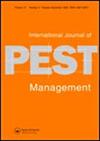Management of Striga hermonthica (Del.) Benth in Nigerian savanna upland rice fields – current challenges and approaches
IF 1.1
4区 农林科学
Q3 ENTOMOLOGY
引用次数: 0
Abstract
AbstractStriga hermonthica is fast spreading in the Nigerian savanna and is predicted to encroach into the rainforest part of the country soon. S. hermonthica seedbanks in savanna soils have continued to rise due to poor agronomic practices by smallholder farmers. Considering differences in soil, climate, and agronomic practices within the savanna endemic agroecology, the severity of the infestation of S. hermonthica has varied from one location to another. Hence, there is a need to model a site-specific management approach for S. hermonthica in Nigeria. This review aims to understand the state-of-the-art management of S. hermonthica in Nigeria’s upland rice fields and further harmonize potential management approaches. Based on studies conducted in Nigeria, reducing S. hermonthica parasitism over a long-term period in the Savanna ecology of Nigeria implies the rotation of upland rice with trap crops, and enhancement of nitrogen fertility in farmers’ fields, combined with the use of seed-treated resistant or tolerant cultivars. In practical terms, farmer’s-research engagement in the long term is pertinent to reduce the severity of S. hermonthica in threatened areas.Keywords: Striga hermonthica (Del.) Benthupland riceNigeriasavanna ecologyparasitic weeds Disclosure statementThe authors declare no conflict of interest on this article.月曲菌的治疗(德尔)尼日利亚热带稀树草原旱地稻田——当前的挑战和方法
摘要在尼日利亚的热带稀树草原上,刺蒺藜正在迅速蔓延,预计不久将侵入该国的热带雨林地区。由于小农的不良农艺做法,热带草原土壤中的美洲月季种子库继续增加。考虑到热带稀树草原特有农业生态学中土壤、气候和农艺实践的差异,红月杉侵染的严重程度因地而异。因此,有必要为尼日利亚的S. hermonthica建立一个具体地点管理方法的模型。本综述旨在了解尼日利亚旱地稻稻稻的最新管理方法,并进一步协调潜在的管理方法。根据在尼日利亚进行的研究,在尼日利亚的热带草原生态中,长期减少hermonthica的寄生意味着旱稻与陷阱作物轮作,提高农民田地的氮肥肥力,并结合使用经过种子处理的抗性或耐受性品种。实际上,从长远来看,农民的研究参与与减少受威胁地区的红月牙曲霉的严重程度有关。关键词:刺甲声明作者声明在本文中无利益冲突。
本文章由计算机程序翻译,如有差异,请以英文原文为准。
求助全文
约1分钟内获得全文
求助全文
来源期刊
CiteScore
4.70
自引率
6.70%
发文量
74
审稿时长
>12 weeks
期刊介绍:
International Journal of Pest Management publishes original research papers and reviews concerned with pest management in the broad sense, covering the control of pests (invertebrates, vertebrates and weeds) and diseases of plants, fungi and their products – including biological control, varietal and cultural control, chemical controland interference methods.
The management of invasive species is of special interest. We also encourage submissions dealing with interactions of multiple pests such as arthropods and plant pathogens, pathogens and weeds or weeds and arthropods as well as those dealing with the indirect and direct effects of climate change on sustainable agricultural practices.

 求助内容:
求助内容: 应助结果提醒方式:
应助结果提醒方式:


